Last Updated on: 2nd August 2025, 11:02 am
Have you ever looked at your train ticket and wondered, “Is there VAT on this?” You’re not alone. With the complexity of UK tax laws, it’s easy to be unsure about what’s taxable and what isn’t especially when it comes to something as routine as train travel.
Whether you’re commuting daily, travelling for business, or planning a weekend getaway, understanding if VAT applies to your fare could help you manage your costs better.
In this guide, we’ll walk you through whether VAT is applied to train tickets in the UK, explain which travel-related services may include VAT, and offer insight into when you might be able to reclaim it particularly if you’re a business traveller.
By the end, you’ll have a clearer understanding of how VAT works on train fares and what steps to take if you’re looking to claim VAT on certain expenses.
What Is VAT in the UK?
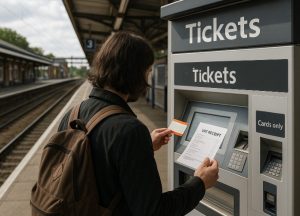
Understanding VAT (Value Added Tax) is essential when assessing travel costs, especially in the UK. VAT is a consumption tax added to most goods and services, and it is governed by rules set by HM Revenue and Customs (HMRC). For businesses and consumers alike, knowing which expenses carry VAT is crucial to managing budgets and tax returns.
When it comes to public transport, the rules are slightly different. Certain transport services are treated favourably under UK tax laws. This means not all services are taxed in the same way.
In the UK, passenger transport services, including trains, are generally exempt from VAT. This exemption plays an important role in keeping public transport affordable and accessible to the general population. However, this exemption doesn’t always apply across the board.
Are Train Tickets in the UK Subject to VAT?
At first glance, you might assume VAT applies to all train tickets, especially given its presence in many other services. However, the answer is not so straightforward.
The majority of UK train tickets are not subject to VAT. They fall under the zero-rated category, which means no VAT is added to the fare. This applies whether you’re purchasing a one-way ticket or a monthly pass.
The exemption applies primarily to the base fare of passenger transportation. That means when you buy a train ticket for a standard journey, the fare is zero-rated and there’s no VAT to reclaim or pay.
But keep in mind that zero-rated is not the same as VAT-free. Technically, VAT is charged at 0%, so while you don’t pay extra, it does fall under VAT law for reporting and accounting purposes.
When Might You Pay VAT on a Train Ticket?

Although regular train fares are VAT-exempt, some additional services linked to your train travel are not. If you upgrade your seat, grab a coffee, or book a sleeper cabin, you may unknowingly be paying VAT on those extras.
Here are examples of when VAT may apply:
- Food and drink purchased on board
- First-class upgrades, particularly the premium element
- Seat reservations bought separately
- Sleeper services or special amenities
If you’re claiming travel expenses for business purposes, understanding which parts are VAT-chargeable is essential. You can’t reclaim VAT on zero-rated fares, but you can on VAT-inclusive extras provided you have a proper VAT invoice.
How to Identify VAT on Extras?
Always check your receipts. If the provider is VAT-registered, the VAT amount should be clearly stated. This is particularly useful if you’re reclaiming VAT as a business expense.
Are Season and Advance Tickets Exempt from VAT?
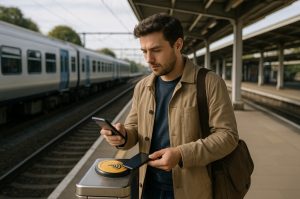
Many travellers in the UK rely on season and advance tickets to save money. But what about the VAT implications? Both season tickets and advance-purchase tickets are VAT exempt. That means whether you buy a monthly pass or secure a discounted journey weeks in advance, you won’t pay any VAT on the base fare.
These tickets fall under the same VAT rules as standard fares:
- The fare portion is zero-rated
- No VAT is added, even for high-volume purchases
- You cannot reclaim VAT, since none is charged
Exceptions to Watch Out For
If your season ticket comes with perks like lounge access or onboard meals, those specific items might attract VAT. Make sure to distinguish between the fare and the extras.
Is There VAT on Public Transport Services in the UK?
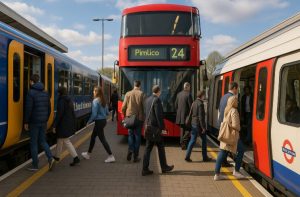
Beyond trains, the VAT treatment of public transport extends to other services like buses, trams, and subways. In general, public transport services are zero-rated for VAT in the UK, but again, there are exceptions based on the nature of the service.
Here’s a breakdown:
| Public Transport Type | VAT Status |
| Standard train fares | Zero-rated (0%) |
| Bus fares | Zero-rated (0%) |
| Underground services | Zero-rated (0%) |
| First-class or luxury travel | VAT applies (20%) |
| Tourist coach trips | VAT applies (20%) |
| Taxi services | VAT applies (if VAT-registered) |
When VAT Does Apply?
- Private hire vehicles such as limousines
- Luxury coaches with guided tours
- Freight and cargo rail services
- Taxi rides, depending on the driver’s VAT registration
Understanding these differences ensures you won’t be caught off guard when using or claiming transport services.
Can You Claim VAT Back on Train Travel?
If you’re a business traveller, you may wonder whether VAT paid on train tickets can be reclaimed. In most cases, the answer is no, since most tickets are zero-rated.
You can only reclaim VAT on services where VAT has actually been charged. For train travel, that means:
- Standard train fares: No VAT to reclaim
- First-class extras: VAT can be reclaimed (if invoiced)
- Food and drink: VAT reclaimable if used for business purposes
- Other services: VAT can be reclaimed where applicable and supported by valid documentation
Make sure to always request a VAT invoice when purchasing business-related extras during your travel.
What About VAT on Other Travel Expenses in the UK?

While train fares are generally zero-rated, many other travel-related expenses are not. Knowing the VAT treatment of different services helps with accurate record-keeping and claiming eligible refunds.
| Expense Type | VAT Treatment | Can You Claim VAT? |
| Train tickets | Zero-rated | No |
| Taxi fares | Standard-rated (20%) | Yes, if VAT invoice given |
| Hotel stays | Standard-rated (20%) | Yes |
| Car rentals | Standard-rated (20%) | Yes |
| Fuel | Standard-rated (20%) | Yes |
| Airfare | Zero-rated | No |
| Parking (private) | Standard-rated (20%) | Yes |
Important Notes:
- Always ask for a VAT invoice
- Keep receipts and match them to your expense categories
- Only claim VAT on business-use costs
How Should Businesses Account for VAT on Travel?
VAT accounting is a vital process for businesses. Even if certain services are zero-rated, you need to accurately track, record, and report VAT to stay compliant with HMRC.
Here are key steps:
- Register for VAT if turnover exceeds the threshold
- Track expenses with clear invoices and receipts
- File VAT returns quarterly or annually
Businesses must ensure the correct VAT treatment for:
- Travel reimbursements
- Expense claims for employees
- Input VAT claimed during business operations
Record Keeping Essentials:
- Keep VAT invoices for six years
- Ensure VAT numbers are valid
- Use accounting software for easy reconciliation
Keeping well-organised records helps avoid audits, penalties, and VAT rejections.
Conclusion
Navigating the rules around VAT on train tickets in the UK doesn’t have to be confusing. For most journeys, the good news is that train fares are zero-rated, meaning VAT doesn’t apply and you won’t see any added tax on your standard ticket.
However, not everything related to your travel is VAT-free. From first-class upgrades to onboard refreshments and special services, there are scenarios where VAT does apply and if you’re a business, you may be able to reclaim it.
Understanding these distinctions allows you to plan your travel expenses more accurately and ensure your business claims are compliant.
Always keep receipts, check for VAT invoices, and know what parts of your journey are tax-deductible. Whether you’re a commuter, tourist, or company accountant, having clarity on VAT and train travel will help you make smarter financial decisions every time you ride the rails.
FAQs
Can you claim VAT on business-class train tickets in the UK?
You can only claim VAT on the upgrade portion of a first or business-class ticket if it’s separately itemised and charged with VAT.
Are sleeper train services subject to VAT in the UK?
Yes, sleeper services and sleeping berths often include VAT as they are considered additional services beyond standard travel.
Do train operators provide VAT invoices for standard tickets?
No, since standard tickets are zero-rated, they usually don’t come with a VAT invoice unless extras are included.
Is VAT included in railcards and travel passes?
Railcards and most travel passes are VAT-exempt if they only cover public transport fares. Added perks may carry VAT.
Can tourists reclaim VAT on train tickets in the UK?
No, tourists cannot reclaim VAT on zero-rated train fares as there is no VAT charged to begin with.
Are student and discounted train tickets treated differently for VAT?
No, the VAT treatment is the same regardless of discount. Standard and student tickets are both zero-rated.
Can VAT be claimed on food purchased during train travel?
Yes, if the food is bought for business travel and you obtain a valid VAT invoice, it may be reclaimed.
Recent Posts
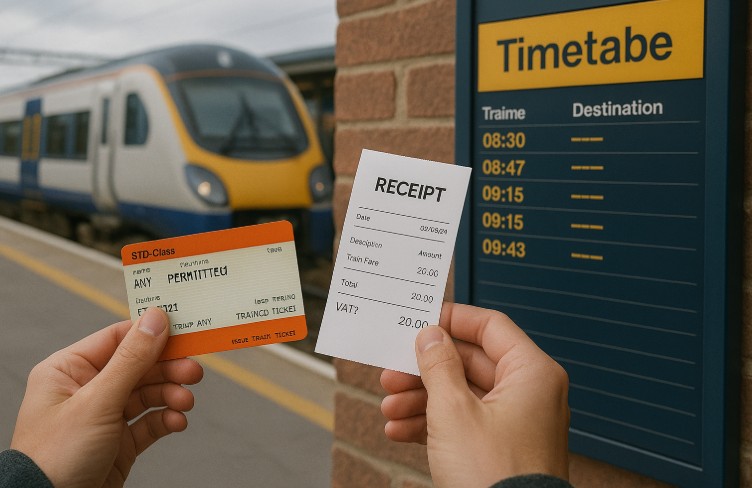










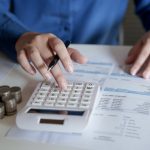

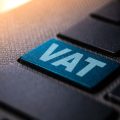


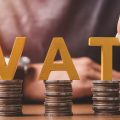
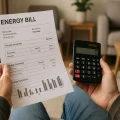


No Comments
Leave a comment Cancel